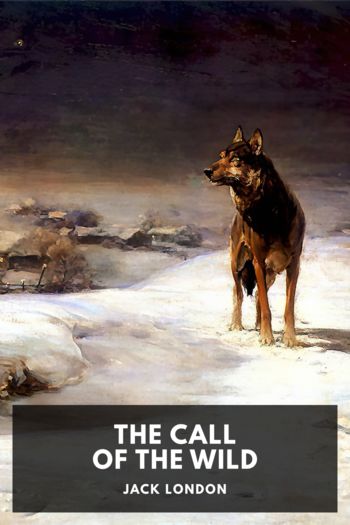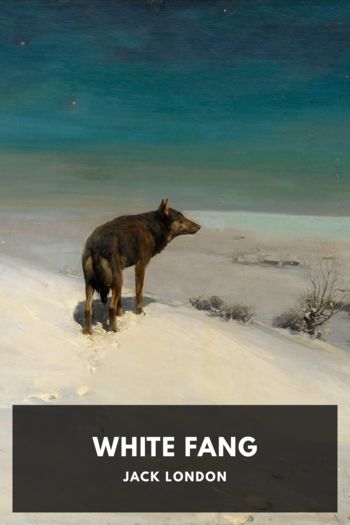The Call of the Wild - Jack London (most popular ebook readers TXT) 📗

- Author: Jack London
Book online «The Call of the Wild - Jack London (most popular ebook readers TXT) 📗». Author Jack London
The blood-longing became stronger than ever before. He was a killer, a thing that preyed, living on the things that lived, unaided, alone, by virtue of his own strength and prowess, surviving triumphantly in a hostile environment where only the strong survived. Because of all this he became possessed of a great pride in himself, which communicated itself like a contagion to his physical being. It advertised itself in all his movements, was apparent in the play of every muscle, spoke plainly as speech in the way he carried himself, and made his glorious furry coat if anything more glorious. But for the stray brown on his muzzle and above his eyes, and for the splash of white hair that ran midmost down his chest, he might well have been mistaken for a gigantic wolf, larger than the largest of the breed. From his St. Bernard father he had inherited size and weight, but it was his shepherd mother who had given shape to that size and weight. His muzzle was the long wolf muzzle, save that it was larger than the muzzle of any wolf; and his head, somewhat broader, was the wolf head on a massive scale.
His cunning was wolf cunning, and wild cunning; his intelligence, shepherd intelligence and St. Bernard intelligence; and all this, plus an experience gained in the fiercest of schools, made him as formidable a creature as any that roamed the wild. A carnivorous animal living on a straight meat diet, he was in full flower, at the high tide of his life, overspilling with vigor and virility. When Thornton passed a caressing hand along his back, a snapping and crackling followed the hand, each hair discharging its pent magnetism at the contact. Every part, brain and body, nerve tissue and fibre, was keyed to the most exquisite pitch; and between all the parts there was a perfect equilibrium or adjustment. To sights and sounds and events which required action, he responded with lightning-like rapidity. Quickly as a husky dog could leap to defend from attack or to attack, he could leap twice as quickly. He saw the movement, or heard sound, and responded in less time than another dog required to compass the mere seeing or hearing. He perceived and determined and responded in the same instant. In point of fact the three actions of perceiving, determining, and responding were sequential; but so infinitesimal were the intervals of time between them that they appeared simultaneous. His muscles were surcharged with vitality, and snapped into play sharply, like steel springs. Life streamed through him in splendid flood, glad and rampant, until it seemed that it would burst him asunder in sheer ecstasy and pour forth generously over the world.
“Never was there such a dog,” said John Thornton one day, as the partners watched Buck marching out of camp.
“When he was made, the mould was broke,” said Pete.
“Py jingo! I t’ink so mineself,” Hans affirmed.
They saw him marching out of camp, but they did not see the instant and terrible transformation which took place as soon as he was within the secrecy of the forest. He no longer marched. At once he became a thing of the wild, stealing along softly, cat-footed, a passing shadow that appeared and disappeared among the shadows. He knew how to take advantage of every cover, to crawl on his belly like a snake, and like a snake to leap and strike. He could take a ptarmigan from its nest, kill a rabbit as it slept, and snap in mid air the little chipmunks fleeing a second too late for the trees. Fish, in open pools, were not too quick for him; nor were beaver, mending their dams, too wary. He killed to eat, not from wantonness; but he preferred to eat what he killed himself. So a lurking humor ran through his deeds, and it was his delight to steal upon the squirrels, and, when he all but had them, to let them go, chattering in mortal fear to the treetops.
As the fall of the year came on, the moose appeared in greater abundance, moving slowly down to meet the winter in the lower and less rigorous valleys. Buck had already dragged down a stray part-grown calf; but he wished strongly for larger and more formidable quarry, and he came upon it one day on the divide at the head of the creek. A band of twenty moose had crossed over from the land of streams and timber, and chief among them was a great bull. He was in a savage temper, and, standing over six feet from the ground, was as formidable an antagonist as even Buck could desire. Back and forth the bull tossed his great palmated antlers, branching to fourteen points and embracing seven feet within the tips. His small eyes burned with a vicious and bitter light, while he roared with fury at sight of Buck.
From the bull’s side, just forward of the flank, protruded a feathered arrow-end, which accounted for his savageness. Guided by that instinct which came from the old hunting days of the primordial world, Buck proceeded to cut the bull out from the herd. It was no slight task. He would bark and dance about in front of the bull, just out of reach of the great antlers and of the terrible splay hoofs which could have stamped his life out with a single blow. Unable to turn his back on the fanged danger and go on, the bull would be driven into paroxysms of rage. At such moments he charged Buck, who retreated craftily, luring him on by a simulated inability to escape. But when he was thus separated from his fellows, two or three of the younger bulls would charge back upon Buck and enable the wounded bull to rejoin the herd.
There is a patience of the wild—dogged, tireless, persistent as life itself—that holds motionless for endless hours the spider in its web, the snake





Comments (0)